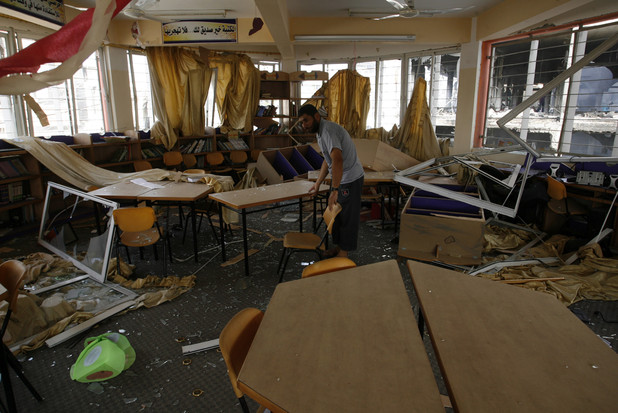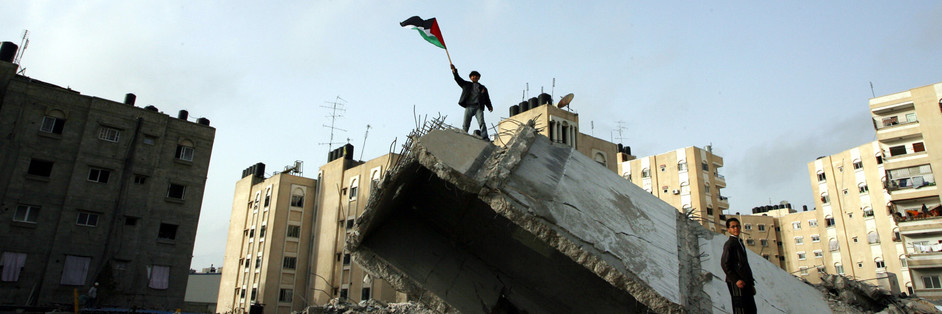How to Boycott Israel: Updated Guidelines for Academics
PALESTINE ISRAEL GAZA GENOCIDE, 8 Sep 2014
Ali Abunimah – Electronic Intifada

A Palestinian man inspects a classroom damaged by an Israeli air strike at a school in Rafah in the southern Gaza Strip, 24 August. (Abed Rahim Khatib / APA images)
2 Sep 2014 – The Palestinian Campaign for the Academic and Cultural Boycott of Israel (PACBI) recently updated its guidelines on how to apply the international academic and cultural boycott of Israel.
This comes at a crucial moment – in the wake of Israel’s latest spasm of horrifying destruction and mass killing in Gaza, and after a period of unprecedented growth in support for boycott, divestment and sanctions (BDS).
Calls for academic boycott will resonate more than ever particularly in light of Israel’s recent bomb attacks on university facilities in Gaza, its violent raids on universities in the West Bank and the financial and political support Israeli universities have themselves given to the carnage.
Right now, hundreds of thousands of Palestinian children in Gaza are not going back to school on time as a direct consequence of the Israeli devastation, while in the West Bank young children face such violence as tear gas fired at them on their way to class.
The school year in Gaza was scheduled to begin on 23 August but has been postponed; Israeli attacks since 7 July killed more than 500 children and injured thousands. In total 220 schools were damaged, 22 of which were completely destroyed.
Children will not be able to go back to class until “war-damaged schools” are repaired and “unexploded ordnance” removed, the UN says.
When children do go back to class, learning will certainly be an even bigger challenge due to the fact that virtually the entire child population in Gaza is in need of psychosocial support due to the trauma of Israel’s 51-day bombardment.
Practical guidance
The updated PACBI guidelines are important for two reasons: they provide a practical reference that can be used to decide if a specific activity is boycottable and they can be used to debunk false claims made by opponents of the boycott, for example that the boycott stifles “academic freedom.”
A common false claim is that PACBI has called for a blanket boycott of Israeli individuals or even of Jewish individuals.
But, PACBI states: “Anchored in precepts of international law and universal human rights, the BDS movement, including PACBI, rejects on principle boycotts of individuals based on their identity (such as citizenship, race, gender, or religion) or opinion.”
A person’s activities are boycottable, however, when “an individual is representing the state of Israel or a complicit Israeli institution (such as a dean, rector, or president), or is commissioned/recruited to participate in Israel’s efforts to ‘rebrand’ itself.”
There are other circumstances as well, as the guidelines detail.
The PACBI guidelines “are mainly intended to assist conscientious academics and academic bodies around the world to be in harmony with the Palestinian call for boycott, as a contribution towards upholding international law and furthering the struggle for freedom, justice and equality.”
PACBI urges:
academics, academic associations/unions, and academic – as well as other – institutions around the world, where possible and as relevant, to boycott and/or work towards the cancellation or annulment of events, activities, agreements, or projects involving Israeli academic institutions or that otherwise promote the normalization of Israel in the global academy, whitewash Israel’s violations of international law and Palestinian rights, or violate the BDS guidelines.
Normalization and “fig-leafing”
Many Palestinians reject initiatives that they say constitute “normalization.” But what does this mean? Here is the definition provided by PACBI:
Academic activities and projects involving Palestinians and/or other Arabs on one side and Israelis on the other (whether bi- or multilateral) that are based on the false premise of symmetry/parity between the oppressors and the oppressed or that claim that both colonizers and colonized are equally responsible for the “conflict” are intellectually dishonest and morally reprehensible forms of normalization that ought to be boycotted.
Far from challenging the unjust status quo, such projects contribute to its endurance. Examples include events, projects, or publications that are designed explicitly to bring together Palestinians/Arabs and Israelis so they can present their respective narratives or perspectives, or to work toward reconciliation without addressing the root causes of injustice and the requirements of justice.
The guidelines gives examples of forms of joint activity that are and are not normalization and also warn against “fig-leafing”:
International academics who insist on crossing the BDS “picket line” by pursuing activities with boycottable Israeli institutions and then visiting Palestinian institutions or groups for “balance,” violate the boycott guidelines and contribute to the false perception of symmetry between the colonial oppressor and the colonized. The BNC (including PACBI) rejects this attempt at “fig-leafing” and does not welcome such visits to Palestinian institutions.
PACBI’s updated guidelines for cultural boycott are here.
The full academic boycott guidelines are here.
__________________________
Ali Abunimah: Co-founder of The Electronic Intifada and author of The Battle for Justice in Palestine, now out from Haymarket Books. Also wrote One Country: A Bold-Proposal to End the Israeli-Palestinian Impasse.
Go to Original – electronicintifada.net
Join the BDS-BOYCOTT, DIVESTMENT, SANCTIONS campaign to protest the Israeli barbaric siege of Gaza, illegal occupation of the Palestine nation’s territory, the apartheid wall, its inhuman and degrading treatment of the Palestinian people, and the more than 7,000 Palestinian men, women, elderly and children arbitrarily locked up in Israeli prisons.
DON’T BUY PRODUCTS WHOSE BARCODE STARTS WITH 729, which indicates that it is produced in Israel. DO YOUR PART! MAKE A DIFFERENCE!
7 2 9: BOYCOTT FOR JUSTICE!
DISCLAIMER: The statements, views and opinions expressed in pieces republished here are solely those of the authors and do not necessarily represent those of TMS. In accordance with title 17 U.S.C. section 107, this material is distributed without profit to those who have expressed a prior interest in receiving the included information for research and educational purposes. TMS has no affiliation whatsoever with the originator of this article nor is TMS endorsed or sponsored by the originator. “GO TO ORIGINAL” links are provided as a convenience to our readers and allow for verification of authenticity. However, as originating pages are often updated by their originating host sites, the versions posted may not match the versions our readers view when clicking the “GO TO ORIGINAL” links. This site contains copyrighted material the use of which has not always been specifically authorized by the copyright owner. We are making such material available in our efforts to advance understanding of environmental, political, human rights, economic, democracy, scientific, and social justice issues, etc. We believe this constitutes a ‘fair use’ of any such copyrighted material as provided for in section 107 of the US Copyright Law. In accordance with Title 17 U.S.C. Section 107, the material on this site is distributed without profit to those who have expressed a prior interest in receiving the included information for research and educational purposes. For more information go to: http://www.law.cornell.edu/uscode/17/107.shtml. If you wish to use copyrighted material from this site for purposes of your own that go beyond ‘fair use’, you must obtain permission from the copyright owner.
Read more
Click here to go to the current weekly digest or pick another article:
PALESTINE ISRAEL GAZA GENOCIDE:
